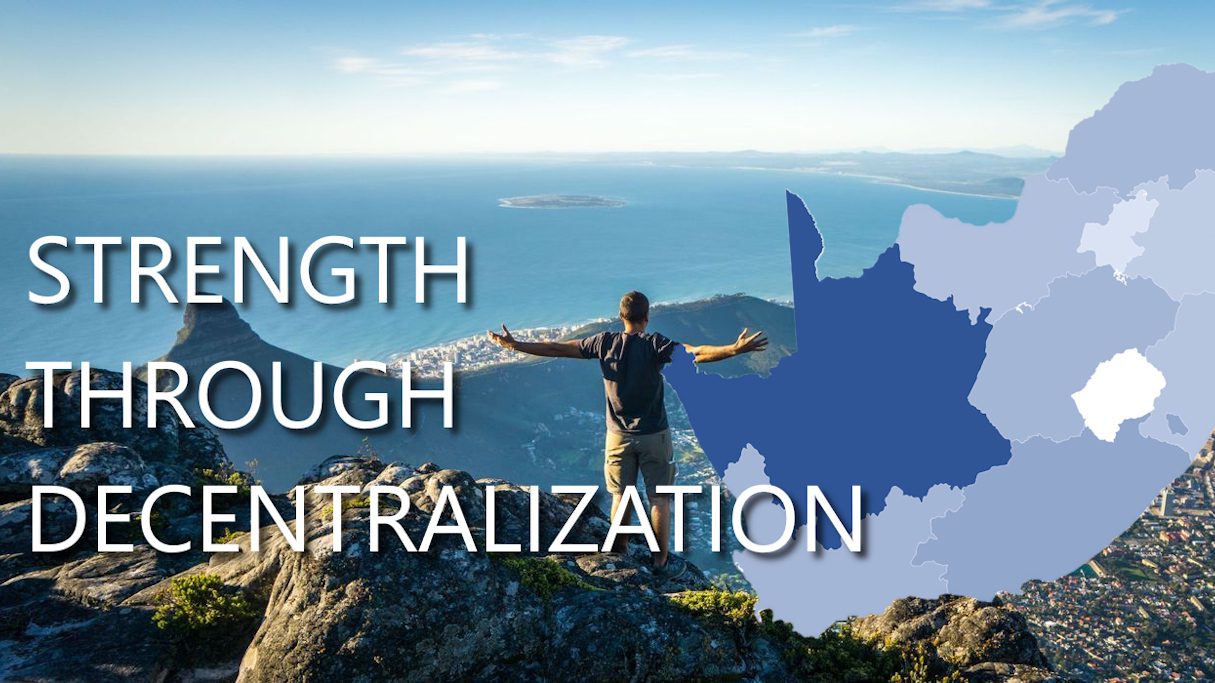* Oorspronklik gepubliseer in Afrikaans deur Maroela Media
South Africa’s post-1994 state model was built on good intentions — national unity, shared resources, and the goal of equal opportunity for all. But after three decades of growing bureaucracy and central control, the country remains one of the most unequal in the world. Corruption, inefficiency, and political interference have turned redistribution into a slogan rather than a solution.
If South Africa is to succeed, it must change direction — away from statism and centralization, and toward a transparent, rules-based model of decentralized governance where power, responsibility, and accountability are devolved closer to the people.
Why centralization has failed
The current system channels most tax revenue through national departments in Pretoria, which then allocate budgets to provinces and municipalities through conditional grants. This structure assumes that central oversight ensures fairness. In reality, it ensures delay, waste, and opacity.
Billions of rand are lost each year to poor procurement, under-spending, and corruption. Provinces wait for approvals that never come, while local governments are blamed for failures they can’t fix without resources. Fairness can’t be achieved from afar — it must be built from the ground up.
A new model: transparency with shared responsibility
Instead of trying to manage every decision from Pretoria, a new Equalization and Standards System can empower provinces and municipalities to control their own budgets, while still guaranteeing fairness through transparent redistribution.
This concept is inspired by the “canton model” — often associated with Switzerland — where smaller regions manage their own affairs under a national framework that ensures equity. But in South Africa’s unequal landscape, this model must be adapted to local realities. The goal is not to create wealthy enclaves, but to build capable local governments that can serve their people effectively and transparently.
How the formula works — in plain terms
Each province or municipality would raise most of its own revenue, but a fixed portion (say 25%) would go into a national Equalization Fund. That fund would then redistribute money using a simple formula that balances need and effort.
In basic terms:
Grant = Need Gap × 75% + Effort Bonus × 5–10%
- Need Gap: The difference between what a region can raise locally and what it needs to provide essential services such as education, healthcare, water, and policing at minimum national standards. This ensures poorer areas receive more support.
- Effort Bonus: A small top-up for provinces or municipalities that collect their taxes efficiently, manage their budgets well, and meet service delivery targets. This rewards good governance and discourages dependency.
The numbers can be adjusted, but the principle is simple: the poorer get help, and the efficient get rewarded. Everyone sees the same published data, so the process is transparent and beyond political manipulation.
Funding the basics for everyone
Under this model, the state guarantees measurable service floors — for example, one teacher per 33 learners, reliable clean water for 95% of residents, or reasonable police response times. These are rights, not privileges.
If a province or municipality fails to meet these standards, it triggers a technical support or temporary management intervention, but the rules remain clear and the data visible to the public. Funding becomes a function of need and performance, not politics or party loyalty.
From provinces to cantons and municipalities
While provinces would manage the main equalization framework, the same approach should apply within provinces — down to municipal and local levels. In this layered system:
- Provinces act as equalizers between municipalities.
- Municipalities, in turn, act as cantons, accountable for their own revenue, delivery, and transparency.
- Every level of government publishes the same kind of open dashboards: revenue raised, funds received, performance achieved.
In time, this would foster a culture of local autonomy and accountability, where citizens directly see what is delivered for their taxes — whether in Constantia, Khayelitsha, or rural KwaZulu-Natal.
Why this strengthens, not fragments, South Africa
Critics of decentralization argue it could entrench inequality. The opposite is true. What deepens inequality is corruption and inefficiency — not autonomy. The Equalization and Standards model keeps redistribution, but makes it visible, conditional, and rules-based.
When provinces and municipalities know that good governance is rewarded and bad governance costs them funding, performance improves. And when citizens can see where every rand goes, public trust begins to recover.
This is not federalism for its own sake, nor a path to secession — it is smart decentralization: power where it works best, supported by transparent solidarity.
A stronger GNU through shared power
The Government of National Unity (GNU) has an opportunity to reset South Africa’s governance structure. A stronger GNU would not mean more ministries or central committees — it would mean a clear framework for cooperative, rules-based decentralization.
Reform should begin with:
- A Constitutional Fiscal and Standards Commission to calculate needs and monitor delivery.
- A Public Accountability Act requiring all tiers of government to publish open budgets and dashboards.
- A Performance-Based Grant System linking funding directly to results.
This is how a coalition government proves its worth — by building institutions, not patronage networks.
The path to a capable, fair state
South Africa doesn’t lack money or talent; it lacks transparency, accountability, and local empowerment. By decentralizing governance within a national framework of fairness and performance, the country can finally deliver what centralization has failed to achieve: equity with dignity.
A better South Africa will not come from a stronger state, but from stronger provinces, municipalities, and communities — the building blocks of a capable, fair republic.
Fairness with freedom. Accountability with trust. That’s how South Africa moves forward.
Dr. Joan Swart has a PsyD Forensic Psychology, an MBA and a Masters in Military Studies. She is a director of CapeXit NPO.

